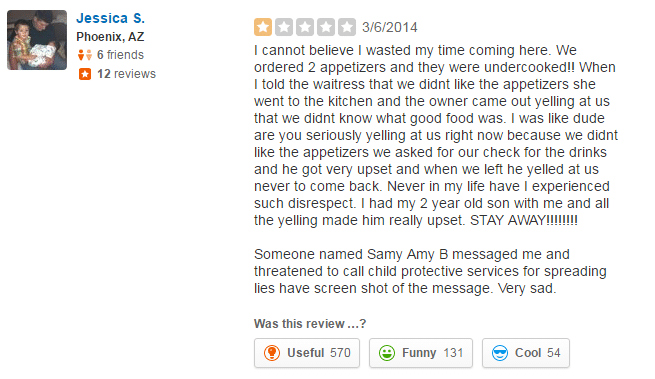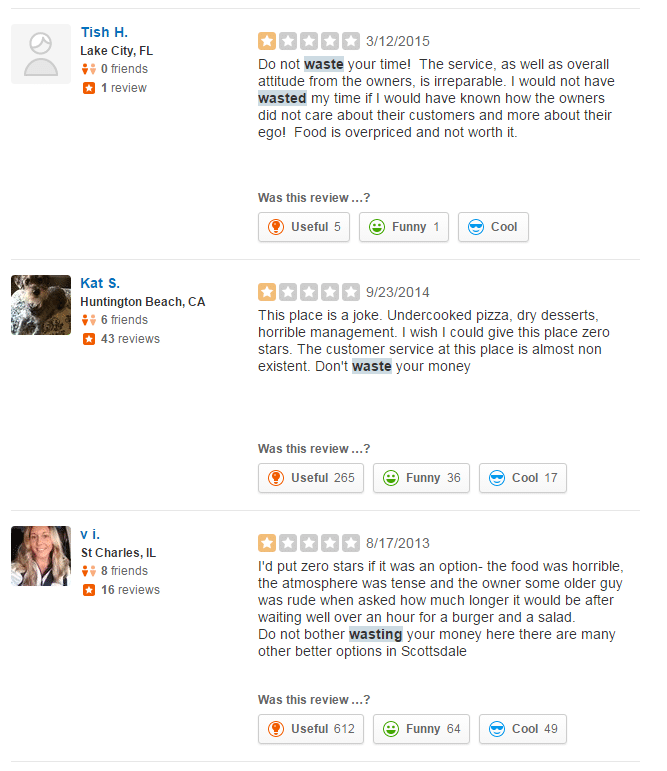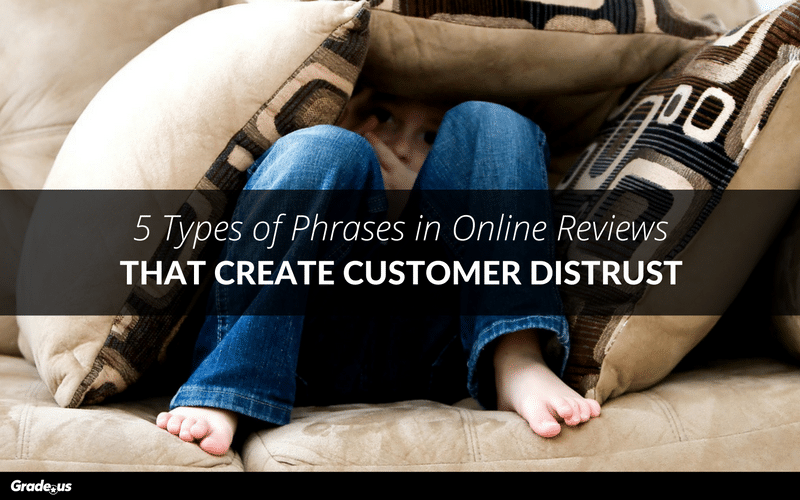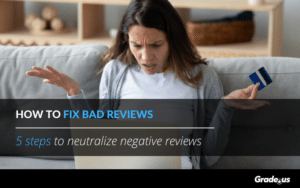Remember Amy and Samy Bouzaglo?
They’re the couple behind the infamous Amy’s Baking Company. They made headlines in 2013 after they appeared on Gordon Ramsay’s Kitchen Nightmares.
It didn’t go well.
Caution: The video below contains some NSFW language.
They threatened to stab customers. Stole tips from their servers. Repackaged other people’s products and sold them as their own. Things went so badly that for the first time ever, Ramsay broke off his agreement to help and he walked away.
It got worse.
After the episode aired, the backlash was swift and severe. People began criticizing their company on Google, Facebook, Reddit, and Yelp. They left strong minded reviews on their listings.

These restaurateurs decided to “fight back.” They threatened reviewers, lied to their customers and mocked naysayers. With behavior like theirs, it’s no surprise their business closed in 2015.
Their Behavior Created Outrage and Distrust
When we look at their behavior, it’s easy to become judgmental. Millions of people made judgments of their own because let’s face it, the Bouzaglo’s behavior was extreme and offensive.

Sift through the angry criticism and we see that customers used lots of phrases to describe their experience.
- Waste of money
- Atmosphere was tense
- Downright gross
- We won’t be back

Yikes.
The phrases most customers used showed they weren’t happy at all. Most customers felt their experience was as bad as they expected it to be. What’s worse, their reviews showed it too.
How?
With their phrasing.

Customer Phrasing Creates Distrust
It’s the same for you. You already know your customers use phrases to describe their experience. What you may not know is this:
Some of these phrases are revenue killers.
Reviews, testimonials, feedback – these are all forms of social proof. A way for customers to buy with confidence. Because social proof has one job to do.
To defuse objections.
When your reviews are loaded down with the wrong words and phrases, the opposite happens. Your content begins to create new objections. That’s right, the wrong phrase increases customer resistance, limiting your ability to make the sale. Social proof does more harm than good at that point.
When this gets out of hand customers assume the worst and believe these negative reviews. They disappear quietly, never to return.
But which phrases create distrust and why? How on earth are you supposed to control what random customers choose to write in their reviews? Can you control what random customers choose to write?
Dealing with the consequences of other people’s choices can be incredibly frustrating, especially if the consequences to you are negative.
First, Identify the Phrases that Create Distrust
We’re talking about phrases, so it’s easy to get distracted with the phrases themselves. Don’t do it. Focus your attention on thecause of these phrases.
Customer phrases point to something deeper.
The phrases are tangible details customers use to communicate something intangible about the businesses they frequent.
- Behavior. Attempting to stab your customers, like Samy Bouzaglo did, is extreme behavior you can see. It’s highly visible.
- Meaning. Samy’s behavior communicated the intangible message, “we’re volatile, you’re not safe here.” His behavior created fear and stress (more intangibles), creating extreme distrust.
Since customer phrases point to something deeper, that means you’ll need spend some time looking for the deeper issues at play. That’ means you’ll need to…
Match Customer Phrases to Meaning
Tai Lopez is an internet entrepreneur. If you’ve watched a YouTube video at any point in 2015 there’s a good chance you saw his ad. He markets information products, claiming to teach his students his 67 steps to “the Good Life.”
Vice lists Lopez as the Internet’s Most Hated Self-Help Guru.
The hatred he receives seems to be imbalanced. What’s interesting about this are the phrases people use to describe him. These phrases seem to appear on a number of high profile sites but so far, nothing has been done about it.

The same phrases follow him around and make no mistake these phrases are having a negative effect on his business.
- Is Tai Lopez a scam?
- Tai Lopez… A fraud? Scam artist?
- How did Tai Lopez, a dropout get CFP designation?
- Has anyone tried Tai Lopez’s 67 steps?
There’s a common thread with Tai, can you see it?
It’s distrust.
People don’t feel they can trust him. The phrases people use tend to be different, but the meaning behind them are the same. I don’t trust you. And when we look at industries where someone’s health, life or well being is on the line (like Doctors and Lawyers) trust is paramount to choosing a business.
So how would you work with this in your business?
It’s simple. You work backwards.
Start with a List of Objections
We want customers to buy our products or services, but unresolved objections make that pretty difficult. Distrust always has a reason (valid or not). So, you create a list of desires, goals, fears, frustrations, and risks, that your customers might have. Then, once you have your list, you turn these into objections.
When you’re done go through your reviews looking for phrases that fit into one of these five categories.
What if you don’t have reviews with these objections? What if your product is new and you don’t have any reviews yet? How are you supposed to get the intel you need?
It’s simple.
Let’s do a little role playing. Imagine you’re creating a new robot vacuum. You’d like to take on some of the heavy hitters like iRobot’s Roomba, but you’re noticing a lot of skepticism.
As a new company, you have zero reviews. You’re smart so you decide to do the smart thing and analyze competitor reviews for clues. Going through their reviews you see customer…
- Desires: “I want my floors and carpet to be spotless but I don’t want to clean it myself.”
- Goals: “I want to set and forget my robot vacuum. What’s the point if I have to keep moving my vacuum from room to room?”
- Fears: “What if it drags dog poop all over the ground, ruining my carpet or hardwood floors?”
- Frustrations: “My Roomba can’t handle clutter, dog hair or obstacles. It gets locked in rooms, knocks things over and doesn’t clean the whole house.”
- Risk: “How long will my robot vacuum last? I don’t want to spend the money on something that falls apart after I buy it.”
Each of these categories gives you a clear set of objections to pursue. These unpleasant explanations tell you a lot about customer expectations; browsing through these reviews should show you whether competitors are meeting expectations (or not). It also shows you how to improve trust and satisfaction.
But the most important part?
It flushes out the phrases that create customer distrust.
These Phrases aren’t Necessarily Easy to Find…
But objections are the key to finding them. Objections come in two distinct flavors.
1. Logistical objections “How long will it take for you to do the work? What happens if I’m unhappy with your service? What do I have to do to get the results you’ve promised?”
2. Non-logistical objections “Why is your price so high? why should I choose you? What makes your service unique?”
Want to negate the distrustful phrases customers use in their reviews? Go through your list of objections one-by-one, creating a solution for each. Then, when you ask customers for reviews, tell them about how you’ve defused their objections like this.
Hey Jan,Customers told us they were worried about our vacuums. That they wouldn’t be able to keep up with Hoover or Dyson products. 97% percent of them stated they were pleasantly surprised.
Was that the case for you or was your experience different?
Would you share your story with us?
You’re amazing!
Andrew
When customers say yes, you follow up with a brief five or six question survey to get all-star reviews.
Customers Will Write What They Want Anyway
Why bother?
You conduct a survey and ask questions only to have customers write what they want in the review anyway. What’s the point?
That’s the concern, right?
True, but that’s only a concern if they write the review. If you ask for a 3 to 5 minute phone call they’re far more likely to say Yes. You ask for their permission to record the call, then, when the call is done you transcribe it.
You send an automated email out asking them to share their thoughts as a review, like this:
Jan,That was fantastic! Thanks soo much for sharing your thoughts. Here’s a copy of our conversation.
Quick favor to ask.
Would you be willing to post your feedback as a review on Facebook or Google? If you are, just click the link below then copy and paste! Done in 60 seconds!
Thanks in advance,
Andrew
Here’s the beautiful part. Thanks to providers like Twilio you’re able to programmatically record, store and transcribe calls. It’s a process you can automate or semi-automate.
There’s No Reason to Accept Distrust Lying Down
As business owners, Amy and Samy Bouzaglo behaved terribly. Their threatening attitude, blatant dishonesty and unwillingness to change doomed their business.
As we’ve seen, their behavior created outrage and distrust. They were completely oblivious to the damage. The words and phrases customers used in their reviews extended the damage to their business. People reading these customer reviews believed Amy and Samy to be untrustworthy (which they were). They were oblivious.
But you’re not.
If you’ve read this far you’re in-the-know. You know the secret behind customer distrust. You’re able to find and fix the damage negative phrases leave behind. Want trustworthy reviews from all-star customers? You have what you need. Start small, work consistently and you’ll slowly develop the trustworthy reviews you crave, no nightmare necessary.
About the Author
Andrew McDermott
Andrew McDermott is the co-founder of HooktoWin. He shows entrepreneurs how to attract and win new customers.










